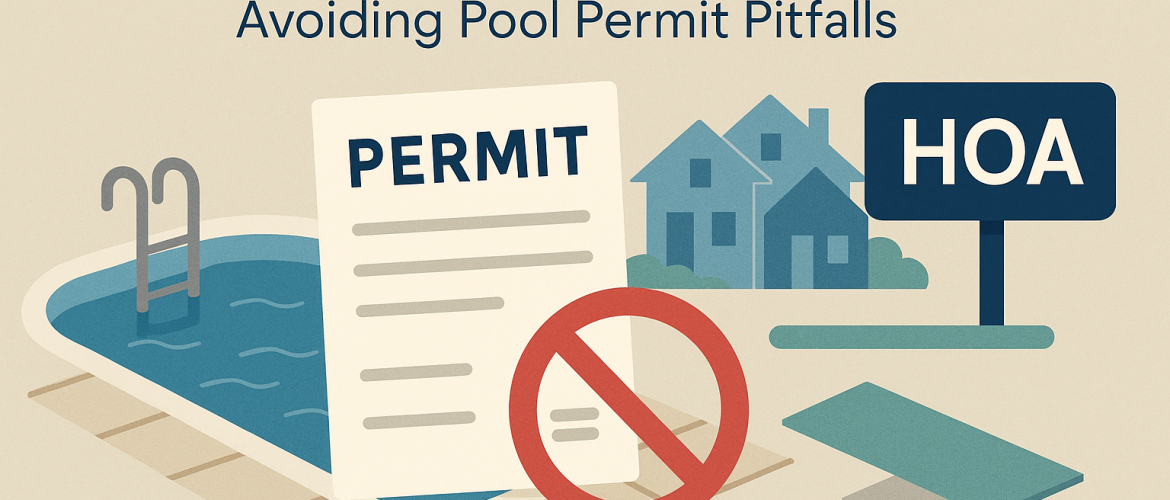Installing a backyard pool is a dream project for many homeowners, especially in hot-weather cities where pools are as common as patios. But before the first shovel hits the dirt, it’s crucial to navigate an often-overlooked obstacle: HOA and neighborhood rules. Overlooking these guidelines can lead to project delays, unexpected fines, or even forced removal of your pool.
Here’s what every homeowner needs to know before building a pool, plus how to avoid costly permit pitfalls.
Understanding the HOA’s Role
If you live in a community governed by a homeowners association (HOA), you likely agreed to abide by a set of rules called Covenants, Conditions, and Restrictions (CC&Rs) when you bought your home. These rules can be broad or highly specific, and they often include provisions related to outdoor structures, including pools.
Your HOA may regulate:
- Pool size, shape, or style
- Setback requirements from fences or buildings
- Noise and filtration equipment
- Safety fencing and gate specs
- Construction hours and contractor requirements
- Aesthetic details such as pool tile, decking, or visibility from the street
Even if the city has already approved your pool permit, your HOA can still deny the project. Their approval process is separate and must be completed before construction begins.
Common Pool Permit Mistakes
A residential pool requires more than HOA approval. City and county permitting departments enforce building codes that cover safety, plumbing, electrical work, drainage, and more. These regulations exist for good reason, but many homeowners misstep by assuming their contractor is handling every detail.
Mistakes to avoid:
- Skipping HOA pre-approval: Always secure HOA approval in writing before submitting for a city permit.
- Using unlicensed contractors: If your builder doesn’t hold the correct license, both the HOA and the city can halt construction.
- Improper setbacks: Building too close to a neighbor’s lot line or a utility easement can lead to fines or forced demolition.
- Missing inspections: Local governments often require multiple inspections throughout the process, not just at completion.
To reduce risk, work with a pool contractor who knows how to coordinate between local governments and HOAs. Companies like Vista Pools LLC specialize in guiding homeowners through both tracks, public and private, so no critical detail is overlooked.
What to Ask Before Building
Start your project by asking these five questions:
- Does my HOA require pool approval?
Don’t assume silence means permission. Request a copy of your CC&Rs and consult the architectural committee. - What is the timeline for HOA approval?
Some HOAs meet monthly, while others have rolling submissions. Factor in time for review and potential revisions. - Can I choose any contractor?
Your HOA may require contractors to be licensed, insured, and approved in advance. Many also restrict construction hours. - Are there restrictions on fencing or visibility?
Some communities require fences that match the neighborhood style, and others restrict pools visible from the street or neighboring lots. - Do I need permits from the city even with HOA approval?
Yes. HOA approval does not exempt you from city permitting. The reverse is also true: a city permit won’t protect you from HOA violations.
When Problems Arise
Unfortunately, some homeowners proceed without fully understanding the rules. The consequences can be expensive:
- Stop-work orders from the city or county
- Daily fines from the HOA
- Mandatory removal of unapproved structures
- Insurance issues if the pool lacks a permit
If you find yourself facing a violation, take action immediately:
- Stop construction until you resolve the issue
- Contact your HOA and request a retroactive application or variance
- Hire legal counsel if the dispute escalates beyond fines or notices
- Consult your builder to ensure all city permits and inspections are in place
Avoiding Pitfalls with the Right Partners
Pool installation isn’t just about digging and decking. It’s about logistics, paperwork, and neighborhood politics. A good contractor won’t just build a beautiful pool, they’ll manage expectations across your city, county, and HOA.
If you live in Nevada, for example, Las Vegas pool cleaning services and pool builders often double as compliance specialists. They’re familiar with local ordinances, seasonal restrictions, and HOA nuances unique to planned communities in desert climates.
When evaluating contractors, ask:
- Have you worked in my neighborhood before?
- Will you handle both HOA and city submissions?
- Do you include permit fees and inspection scheduling?
- What’s your process for resolving compliance delays?
Transparency and planning are more valuable than speed when it comes to avoiding headaches down the line.
FAQs
What happens if I build a pool without HOA approval?
Your HOA may issue fines, demand modifications, or require full removal of the pool. Even if the city permits the build, the HOA has legal authority within its covenants.
Can my HOA deny my pool even if I meet city code?
Yes. The HOA’s aesthetic and community rules are separate from building code. They can deny approval based on style, location, or other factors.
How long does HOA approval take for a pool?
It varies. Some HOAs approve within two weeks, while others take a month or more. Plan your construction timeline accordingly.
What’s the role of the city vs. the HOA?
The city ensures code compliance, structural, electrical, plumbing, and safety. The HOA enforces community standards. Both approvals are required.
Who handles permits, me or the contractor?
Reputable contractors like Vista Pools LLC typically handle permit applications, drawings, and inspections. Confirm this during your initial consultation.
What pool services are available in Las Vegas after installation?
After your pool is built, you can find ongoing support through local experts like Las Vegas pool cleaning companies. They offer weekly maintenance, chemical balancing, and seasonal services.



